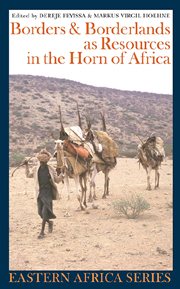Book contents
- Frontmatter
- Contents
- List of Maps, Tables & Charts
- Preface by Günther Schlee
- Editors' Preface
- Notes on Contributors
- List of Acronyms
- 1 State Borders & Borderlands as Resources
- 2 More State than the State?
- 3 Making Use of Kin beyond the International Border
- 4 The Tigrinnya-speakers across the Borders
- 5 Trans-Border Political Alliance in the Horn of Africa
- 6 People & Politics along & across the Somaliland-Puntland Border
- 7 The Ethiopian-British Somaliland Boundary
- 8 The Opportunistic Economies of the Kenya-Somali Borderland in Historical Perspective
- 9 Magendo & Survivalism
- 10 Can Boundaries not Border on One Another?
- 11 Conclusion
- Index
- EASTERN AFRICAN STUDIES
1 - State Borders & Borderlands as Resources
An Analytical Framework
Published online by Cambridge University Press: 05 April 2013
- Frontmatter
- Contents
- List of Maps, Tables & Charts
- Preface by Günther Schlee
- Editors' Preface
- Notes on Contributors
- List of Acronyms
- 1 State Borders & Borderlands as Resources
- 2 More State than the State?
- 3 Making Use of Kin beyond the International Border
- 4 The Tigrinnya-speakers across the Borders
- 5 Trans-Border Political Alliance in the Horn of Africa
- 6 People & Politics along & across the Somaliland-Puntland Border
- 7 The Ethiopian-British Somaliland Boundary
- 8 The Opportunistic Economies of the Kenya-Somali Borderland in Historical Perspective
- 9 Magendo & Survivalism
- 10 Can Boundaries not Border on One Another?
- 11 Conclusion
- Index
- EASTERN AFRICAN STUDIES
Summary
Introduction
In this introductory chapter we offer an analytical framework for researching the resourcefulness of state borders as institutions and borderlands as territories, which is substantiated by the case studies in this volume. The case studies are drawn from the Horn of Africa and eastern Africa, and involve the borders of Djibouti, Eritrea, Ethiopia, Sudan, Somalia, Somaliland, Puntland, Kenya, Uganda and Tanzania. The object of the research is how people who live along and are divided by state borders have adjusted to the borderland situation, and what strategies they use in order to extract different types of resources from borders and borderlands. By resources we refer to immaterial resources such as social relations (across the border), the placement within the territorial, political, or social landscape, or any kind of claim that can be made with regard to state borders and/or borderlands in order to attain social, economic, or political benefits. We also distinguish between borders and borderlands on the following grounds. By borders we mean the institution of inter-state division according to international law; borderlands, on the other hand, are territorially defined as the physical space along the border – on both sides of it (Baud and Van Schendel 1997: 216). Borders and borderlands mutually define one another; the existence of the border constitutes the borderland. We specifically engage with borders as institutions that can be made use of, and borderlands as fields of opportunity for the people inhabiting them.
- Type
- Chapter
- Information
- Publisher: Boydell & BrewerPrint publication year: 2010



